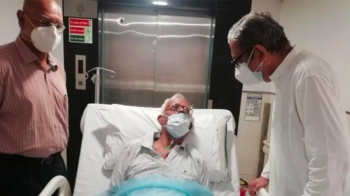
.jpg) Fr. Frazer
Fr. Frazer

My friends, it’s my privilege to say a few words on Stan because it was my privilege, as Father Arun said, “to accompany him during the last month of his life”. About two days before he went into unconsciousness because of heart problem, in the middle of our conversation, he said, “Father Frazer do you understand that you have become an important person of my life.” I told him, “Stan you have become an important part of my life” and we laughed together. For a month, every day I was visiting him and had about half an hour or more conversation with him.
I like to speak on Father Stan, and as you see him here he is dressed as a Catholic priest, holding the chalice, the same chalice that we used for this ceremony, and this is what he valued. He valued his Christian priesthood and whenever I went to visit him, he was interested in receiving Jesus in Holy Communion. One day I forgot to bring the Holy Communion, and the sisters arranged for another priest to give him communion.
I would like to remember him with the word he used for himself and for his friends, ‘Comrade’. He used to say that his comrades were important to him. But don’t think that ‘comrade’ meant the Maoist type, violent one. Stan was gentle and one who loved peace and so there is no question of violence about him. But he considered all those working for humanity specially the deprived sections of the humanity as his comrades and he used this word so often in the last month.
I think it’s important for us to understand this part of Stan because it’s very close to what Pope Francis says about all of us. He talks about social friendship, that we are all brothers and sisters of one another. All human beings are God’s children and they are our brothers and sisters, they are our comrades.
In fact, he worked more with people of other faiths and he considered them his partners, his comrades, his brothers and sisters. This is something that we should learn from him. Almost 40 years ago, I went to the Institute where Stan was director and he taught us Social Analysis. I liked the course as my subject was sociology; the way he explained and helped us to understand the under currents of the Indian society was very inspirational. What inspired me more was the fact that after his stint as the director in academics, he decided to do what he was encouraging others to do; go to the grassroots and work with people in difficult circumstances and he decided to work with tribals.
For 30 years he worked with them and used his social analysis, not just working as an activist. He analysed the situation and found that there are beautiful provisions for the indigenous people of India in our Constitution, but they are not being implemented in many areas. He then tried to work towards the implementation of these provisions of the Constitution.
Fr. Stan was able to blend intellectual work and activism. That’s the reason why he was effective and became a thorn in the side of the powerful. He was successful in getting rights for people. There were three thousand Adivasi young people who had been arrested. He fought for them and was succeeding; that’s the reason why he had to be done away with. He looked for every opportunity to help someone; even when he was taken ill, he was looking to help others. From the ICU, he said to me, ‘Fr. Frazer, I am wondering whether I can donate my body after I die.’ I told him, ‘We will consider it. But Stan you are getting better now.’ We know he had a premonition of death; even after his death he wanted to be useful to someone.
In the penultimate day before he took unconscious he had become a little bit disoriented and he did not recognize me; when he saw me he thought I was a stranger and then I had to introduce myself. Then he came back to reality and told me that he was worried about some of the activists who were being tortured; he was worried about the conditions in the jail and inmates are being ill-treated. I explained to him that the tide was turning now.
My friends, I would like to take this opportunity to thank several people who did a lot for Stan during the last few months. Of course, Fr. Arun has already mentioned the sisters of the Holy family Hospital; in fact, on some of the days in which Stan was better, I think, the sisters pampered him and he enjoyed that; he accepted it; that was a good thing about him. He was ready to accept love and affection.
There are so many like Dr. Eon, Sr. Lucian, Sr. Beena and the whole team of nurses, doctors and others who took care of him. We are all indebted to them. I would also like to thank the lawyers; we have Mihir Desai, Mihir Joshi and Kritika and Mr. Sheriff and others who really took up the case and Stan was quite happy at the way things were going. In fact, he had a call with his lawyers just a few days before he passed away and he expressed great confidence in what they were doing.
We must thank so many people who have helped us, who have prayed for Stan across the world. When he entered Holy Family Hospital, I told him, ‘you know there are lots of people praying for you,’ to which he replied, ‘why do you think I’m carrying on; I’m carrying on because there are people across the world praying.’ So, let’s thank God for Stan, for all those who were important to him in his life.